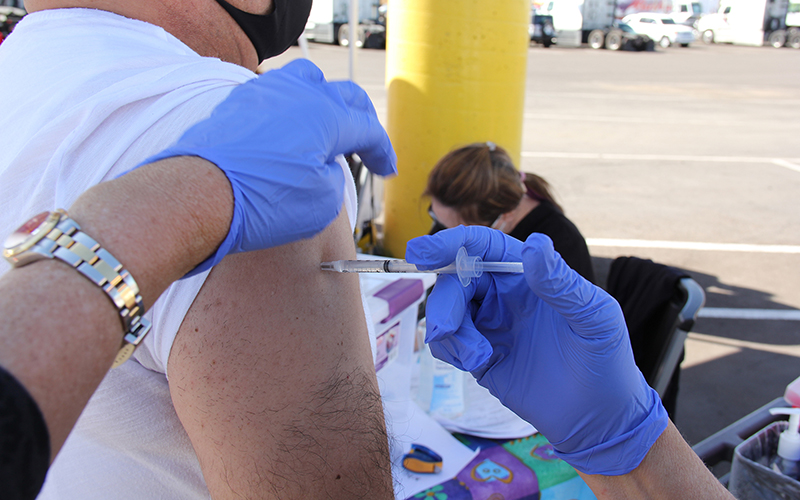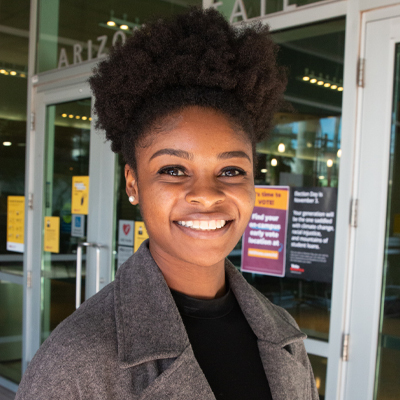PHOENIX – Booster shots of Moderna and Johnson & Johnson’s COVID-19 vaccine were unanimously recommended Friday by the FDA’s Vaccine and Related Biological Products Advisory Committee.
The virtual hearing, which follows Food and Drug Administration approval of a Pfizer booster late last month, is a critical step in administering extra dosages to those who received Moderna and Johnson & Johnson vaccines and whose protection may be waning.
“Although we can’t prevent every infection with boosters … the idea that we can prevent additional infections does provide some value,” said Dr. Steven Pergam, a member of the advisory committee. “In the sense that, COVID does have tremendous downstream effects, even for those who are not hospitalized, and so, I think whenever we can prevent significant morbidity in a population, there are advantages.”
The panel recommended the Moderna booster for ages 65 or older and people who are immunocompromised who already have completed their two-dose regimen. Johnson & Johnson’s booster shots are recommended for anyone 18 or older who has already received their one dose of the J&J vaccine.
The Centers for Disease Control and Prevention reports 8.9 million people in the U.S., or slightly less than 5% of those fully vaccinated, have received their booster dose. As more and more people begin to show signs of waning protection, the approval of these two boosters could play a pivotal role in the national battle against COVID-19.
Here are some frequently asked questions about the booster shots.
What’s the difference between a booster shot and a third dose?
There’s an important distinction to be made between immunocompromised patients receiving their third doses of Pfizer and Moderna, a regimen approved in August, and the emergency approval of these boosters. The third doses administered several months ago were to allow for these individuals to build their immune systems. These boosters are for people whose initial protection may be waning.
Who needs a COVID vaccine booster?
The FDA and the CDC have concluded that those who are immunocompromised, over the age of 65, or who work in locations highly exposed to COVID-19, could benefit from a booster shot.
Some examples of careers that are considered highly exposed by the CDC are: first responders and healthcare workers, education staff, food and agriculture workers, manufacturing workers, corrections workers, Postal Service workers, public transportation workers or those who work in grocery stores.
Why should I get a COVID booster if vaccinated people still are contracting COVID-19?
The goal of vaccination has always been to reduce the chance of death and severe illness, as well as to avoid hospital overcrowding. Complete prevention of the disease is unlikely, but getting a vaccination lessens your chances of needing a ventilator in the hospital.
Won’t my original vaccine regimen be enough?
Data suggest that, especially in the elderly and immunocompromised, the body’s ability to create and maintain antibodies created by exposure to the COVID-19 by way of vaccine diminishes over time. This means that, even if you have received a full regiment of vaccine treatment, your body may lose the ability to battle the virus if enough time has passed since your initial exposure.
The booster is an effective way to take control of exposure to COVID-19, and it lessens the severity of the illness. This can lead to an increased risk of severe reaction and hospitalization the longer
Is natural immunity superior to vaccination? If so, why should I vaccinate at all?
Those who get the vaccine typically have longer-lasting protection against COVID-19 than those who rely solely on natural immunity.
The CDC conducted a study on 156 frontline workers who contracted COVID-19 in the spring of 2020 and found that 94% of the participant’s natural immunity began to lessen after 60 days. This same study also reported that 28% of those same initial infectees reverted to an immune response resembling pre-infection during that same time frame.
In comparison, those who receive a full regiment of either the Pfizer or Moderna vaccination have been shown to have at least six months of protection.
Additionally, the CDC has concluded that, after infection, unvaccinated people are 2.34 times likelier to get COVID-19 again, as compared to fully vaccinated people. This means that naturally contracting COVID-19 provides less protection than a vaccination.
Can I take the COVID-19 booster in conjunction with the flu shot?
According to the CDC, it is perfectly fine to get a COVID-19 vaccine and a flu vaccine at the same time. Patients who receive both vaccines at once should take care to keep to the recommended dosing schedule of each vaccine.
Will I experience any side effects from taking the COVID booster?
The CDC says side effects from the booster appear similar to those experienced from initial exposure to the virus: headache, fatigue, low-grade fever and muscle aches. These were typically experienced quickly after receiving the first dosage and subsided within a day or two.
According to one study, the likelihood of experiencing these symptoms increases if you have been infected with the virus prior to receiving your first dosage.
Serious side effects from the vaccine remain rare, with the CDC officially recognizing only two associated conditions, anaphylaxis and thrombosis with thrombocytopenia syndrome, after vaccination with J&J COVID-19 vaccine.
Can I take a booster of a vaccine different from my original vaccine?
The CDC still does not recommend mixing and matching different mRNA vaccines, and has stated that no more than three dosages of an mRNA vaccine should be administered to an individual. Because J&J is not an mRNA vaccine, CDC guidance is unclear.
A recent study by the National Institute of Health has seen positive results from the mixing and matching of vaccines, including the J&J vaccine, but results are not yet conclusive.



